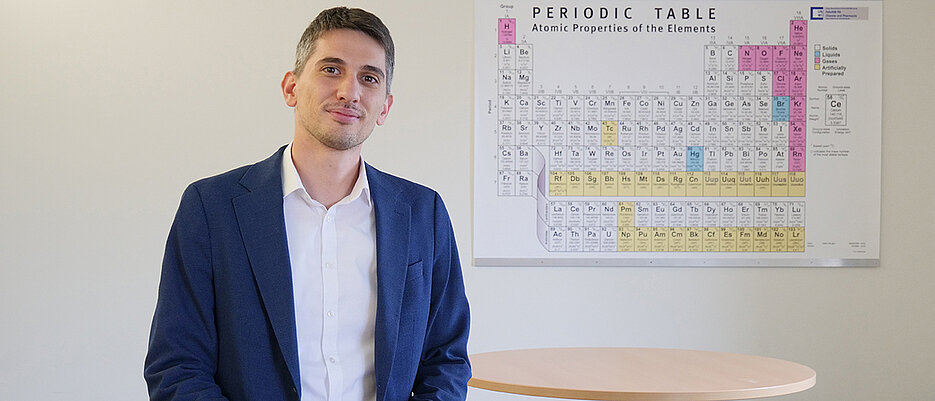Chemistry on the Computer
09/30/2025Expanding knowledge about the nature of molecules through calculations and computer simulations: this is what Tomislav Begušić, new professor of theoretical chemistry, is working on.

Chemists are usually imagined as people wearing white coats and safety goggles, conducting experiments in laboratories. However, there are also chemists who devote themselves to theory and work on computers: they use mathematical models and simulations to describe and predict the properties and reactivity of molecules.
Theoretical chemistry is very helpful in many areas, including the development of innovative materials for electronics or catalysis. Or when it comes to the mode of action and optimisation of drugs. In basic research, it ensures that more and more knowledge about the nature of chemical bonds and reactions is gained.
From Pasadena to Würzburg
Dr Tomislav Begušić, who joined the University of Würzburg as Professor of Theoretical Chemistry on 1 September 2025, also conducts basic research. Prior to coming to Germany, he spent four years as a postdoctoral researcher at the California Institute of Technology in Pasadena (USA).
‘My field has yielded many important insights into atomic and molecular structures over the past decades,’ says the new professor. It has greatly contributed to understanding why some things work in chemistry and others do not.
The 31-year-old has also noticed that theory has been penetrating deeper and deeper into industrial applications. Companies are also increasingly relying on theoretical predictions rather than the more costly experimental approach of trial and error.
Focus on Quantum Dynamics
Tomislav Begušić's area of expertise is the interaction between molecules and light. His research focuses on quantum mechanics and the quantum dynamics of electrons and atomic nuclei.
‘What my experimental colleagues measure when they direct laser pulses at a sample and analyse the resulting light spectra tells us a lot about the materials and the processes taking place within them. However, the analysis often requires theoretical input,’ he explains. In addition, light can not only be used to observe the state of molecules, but also to change it. An interesting question here, for example, is whether light can be used to accelerate chemical reactions.
One of the professor's goals in his work is to develop new computational methods that will enable the simulation of complex processes in molecules. To achieve this, he also draws on advances in other fields, such as the latest findings in quantum computing, data science and machine learning.
The Professor's Career
Tomislav Begušić, born in 1994, grew up in Split, Croatia. He completed his bachelor's degree in chemistry at the University of Zagreb in 2015. For his master's degree, he moved to the Ecole Polytechnique Fédérale in Lausanne, Switzerland. He also completed his dissertation there in 2021 and then moved to the USA.
He has now moved to Würzburg with his family. The Faculty of Chemistry and Pharmacy seems to be just the right place for him: ‘I was familiar with the work of many colleagues in Würzburg, and when I read the requirements for the position here, it was clear to me: the University of Würzburg is the place to be for me.’
Contact
Prof. Dr. Tomislav Begušić, Institute of Physical and Theoretical Chemistry, University of Würzburg, tomislav.begusic@uni-wuerzburg.de






